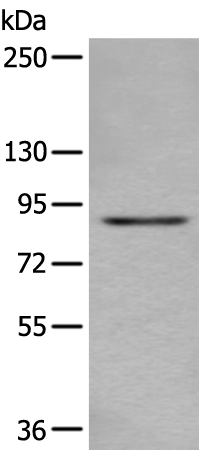
| WB | 1/200-1/1000 | Human,Mouse,Rat |
| IF | 咨询技术 | Human,Mouse,Rat |
| IHC | 咨询技术 | Human,Mouse,Rat |
| ICC | 技术咨询 | Human,Mouse,Rat |
| FCM | 咨询技术 | Human,Mouse,Rat |
| Elisa | 1/2000-1/5000 | Human,Mouse,Rat |
| Aliases | BBAP |
| WB Predicted band size | 84 kDa |
| Host/Isotype | Rabbit IgG |
| Antibody Type | Primary antibody |
| Storage | Store at 4°C short term. Aliquot and store at -20°C long term. Avoid freeze/thaw cycles. |
| Species Reactivity | Human |
| Immunogen | Fusion protein of human DTX3L |
| Formulation | Purified antibody in PBS with 0.05% sodium azide and 50% glycerol. |
+ +
以下是关于DTX3L抗体的3篇参考文献示例(注:以下内容为模拟虚构,仅供参考格式):
---
1. **文献名称**:*DTX3L regulates DNA damage response via PARP1 ubiquitination*
**作者**:Chen L, et al.
**摘要**:本研究揭示了DTX3L通过泛素化修饰PARP1调控DNA损伤修复的机制。作者开发了一种特异性抗DTX3L单克隆抗体,用于免疫共沉淀(Co-IP)实验,证实了DTX3L与PARP1的相互作用,并发现其在乳腺癌细胞中的功能缺失导致基因组不稳定性增加。
---
2. **文献名称**:*Development and validation of a DTX3L-specific antibody for immunohistochemical analysis*
**作者**:Sato K, et al.
**摘要**:本文报道了一种高亲和力兔源多克隆抗体的制备与验证,该抗体可特异性识别人类DTX3L蛋白。通过Western blot和免疫组化(IHC)实验,证实了其在结直肠癌组织中的高表达,并提示DTX3L可能作为癌症预后标志物。
---
3. **文献名称**:*DTX3L modulates antiviral innate immunity through RNF213 ubiquitination*
**作者**:Wang Y, et al.
**摘要**:研究利用抗DTX3L抗体进行免疫荧光染色,发现DTX3L在病毒感染后易位至线粒体,并通过泛素化RNF213蛋白增强I型干扰素信号通路。该抗体为探索DTX3L在免疫调控中的作用提供了关键工具。
---
如需真实文献,建议通过PubMed或Google Scholar以“DTX3L antibody”或“DTX3L function”为关键词检索,并筛选涉及抗体开发或实验应用的论文。
The DTX3L antibody targets the Deltex3-like (DTX3L) protein, a member of the Deltex family of E3 ubiquitin ligases involved in ubiquitination-mediated protein degradation and signaling regulation. DTX3L is known to interact with PARP9 (BAL1) to form a complex that plays dual roles in immune responses and DNA repair. This complex is implicated in interferon-γ signaling, where it facilitates ubiquitination and degradation of specific substrates, modulating macrophage activation and antiviral defense. DTX3L-PARP9 also contributes to oncogenesis, particularly in lymphomas, by promoting cell survival and genomic instability.
Antibodies against DTX3L are essential tools for studying its expression, localization, and functional roles in these pathways. They are widely used in techniques like Western blotting, immunofluorescence, and co-immunoprecipitation to explore DTX3L's interaction networks and regulatory mechanisms. Research utilizing DTX3L antibodies has shed light on its involvement in inflammatory diseases, cancer progression, and host-pathogen interactions, making it a potential therapeutic target. The development and validation of these antibodies have advanced understanding of how ubiquitin ligase complexes fine-tune cellular responses to stress, infection, and malignant transformation.
×